#jacint verdaguer
Text
A Catalan verb I love: formiguejar.
It means "to teem" or "to swarm". The verb comes from the word formiga ("ant" 🐜), and it evokes the constant busy movement of ants, up and down all day without stop.
The poet Jacint Verdaguer used this verb in this verse from his poem Plus Ultra:
L’univers és infinit,
pertot acaba i comença,
i ençà, enllà, amunt i avall,
la immensitat és oberta,
I a on tu veus lo desert
eixams de mons formiguegen.
Here I attempt to translate it to English:
The universe is infinite,
it ends and starts everywhere,
and since, further up there, up and down,
the immensity is open,
And there where you see the desert,
swarms of worlds teem.
Verdaguer was a master in creating this mental images. In this case, I love how these two lines ("and there where you see the desert / swarms of worlds teem") because the verb is very descriptive of this view, that seems still and quiet to us, but if we were to take a close look, we would see thousands in constant movement, at a minuscule scale maybe, but with no stop.
Find the full poem + English translation under the cut.
Plus Ultra by Jacint Verdaguer.
Original poem in Catalan:
estello, fai-te clara,
car cerque moun camin.
Allà dellà de l’espai
he vist somriure una estrella
perduda en lo front del cel
com espiga en temps de sega,
com al pregon de l’afrau
una efímera lluerna.
-Estrelleta –jo li he dit-,
de la mar cerúlia gemma,
de les flors de l’alt verger [heaven]
series tu la darrera?
-No só la darrera, no;
no só més que una llanterna
de la porta del jardí
que creies tu la frontera.
És sols lo començament
lo que prenies per terme.
L’univers és infinit,
pertot acaba i comença,
i ençà, enllà, amunt i avall,
la immensitat és oberta,
I a on tu veus lo desert
eixams de mons formiguegen.
Dels camins de l’infinit
són los mons la polsinera
que puja i baixa a sos peus
quan Jehovà s’hi passeja.
English:
star, shine bright
for I am searching for my path.
Up there, on the other side of space
I have seen a star smile
lost in the sky's front
like a wheat spike in reaping time,
like the depths of a canyon
an ephemeral torch.
"Little star" I have told her,
"out of the sea's cerulean gems,
out of the flowers of the tall lush [=Heaven]
would you be the last one?"
"I am not the last one, no;
I am nothing more than the lantern
at the garden's gate
that you believed to be the border.
What you took for an end,
is only the beginning.
The universe is infinite,
it ends and starts everywhere,
and since, further up there, up and down,
the immensity is open,
And there where you see the desert
swarms of worlds teem.
The worlds are the dust
of the infinity's paths
that are moved up and down at his feet
when Jehovah [God] takes a walk in them.
Jacint Verdaguer is one of the most beloved Catalan poets of all times. He lived in the 19th century and was very involved in the Catalan revival movement, defending Catalan folk culture and language. He was also deeply religious and became a Catholic priest since an early age.
The poem Plus Ultra was published after Verdaguer's death in 1903.
#llengua catalana#jacint verdaguer#poesia#literatura#arts#catalan#català#coses de la terra#languages#ants#poetry#poem#langblr#literature#lit#quotations#excerpts#space#religious poetry#religious imagery
124 notes
·
View notes
Text
dream catalan blunt rotation:

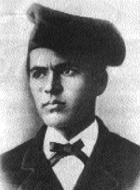

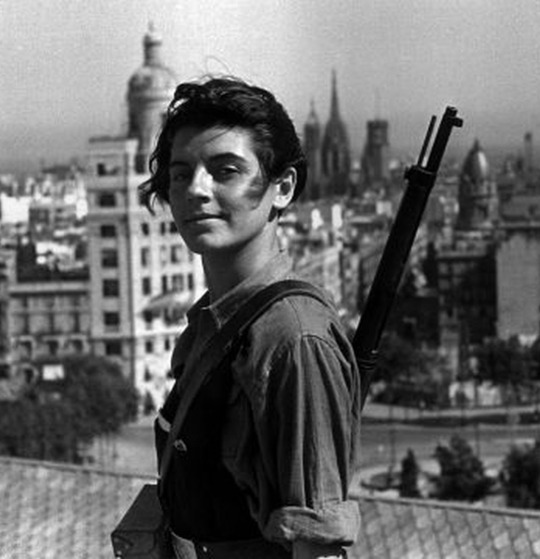
#feel free to add yours#especially you quimera i know you wanna add tirant#(santi rusiñol jacint verdaguer comte arnau i marina ginestà per si no queda clar)#coses de la terra
7 notes
·
View notes
Text
En un article crític publicat, no fa pas gaires dies, sobre mon darrer llibre, Pàtria, lo crític, queixant-se, potser amb raó, de que en mes últimes obres no dono prou destriats los genres literaris, semblava doldre's de que jo deixàs caure massa gotes de poesia religiosa en lo doll de ma poesia patriòtica. Oh!, com m'honrava i me plavia, sense voler, amb això mon benvolgut amic! Com li agraesc l'acusació! Com li agrairia més si el cor me digués que en só mereixedor! Oh, si pogués suavitzar amb lo melós i adorable nom de Déu la seca aspror de tots mos versos! Oh, si deixant a part mon no-res, pogués com altre Eliseu, amb un grapat de sal divina endolcir lo doll cada dia més amargant i terrós de la poesia contemporània que, descreguda, sense cor i sense ànima, va deixant les ales a bocins en lo fang de la matèria!
Jacint Verdaguer, Dietari d'un pelegrí a Terra Santa
0 notes
Text


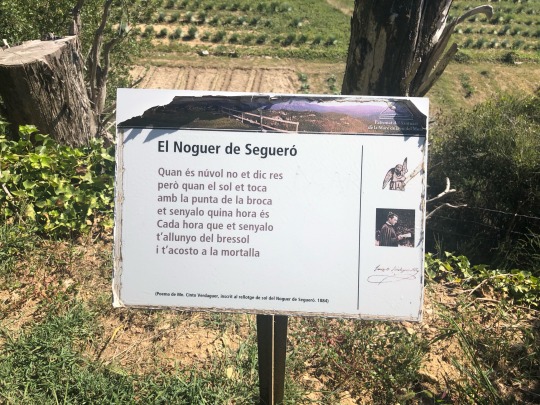
This fine villa, surrounded by equally fine gardens, is the subject of prose and verse by Cinto (diminutive of Jacint) Verdaguer, whom we met earlier.
0 notes
Text
L'emigrant (Amadeu Vives) - Teatro Bolshoi, Moscou 1989
Canção legendada em português: vídeo; legenda.
Montserrat Caballé - vocal
José Carreras - vocal
Miguel Zanetti - piano
É uma canção catalã que canta a saudade dos emigrantes. Foi escrita entre duas grandes ondas de emigração de catalães, principalmente para a América Latina, no final do século XIX.
Letra: O poeta nacional Jacint Verdaguer dedicou um poema a esses emigrantes, geralmente motivados por dificuldades econômicas, no início da década de 1890. O próprio Verdaguer, aos 28 anos de idade, foi capelão em navios de emigrantes entre a Espanha e a América por três anos a partir de 1873.
Em 1893, o poema foi musicado por Amadeu Vives, então com 21 anos de idade, que já havia fundado o coral folclórico Orfeó Català em 1891.
Logo esta canção tornou-se tão popular que foi tratada como um hino nacional por muito tempo. A canção deve seu forte impacto a dois fatores: a séria ruptura que a emigração sempre representa para o indivíduo e para a sociedade como um todo e a melodia simples e cativante de Amadeu Vives.
Jaume Aragall
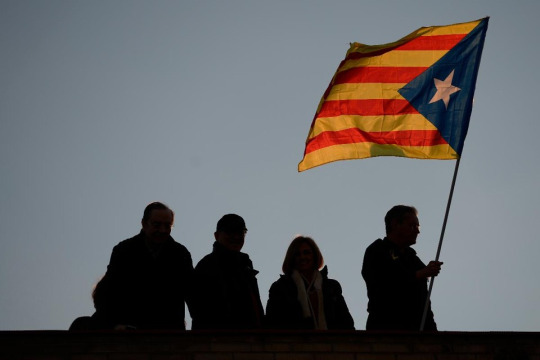
0 notes
Text
Flors, arbres i altres herbes en l’obra de Jacint Verdaguer
Edicions UB publica Les plantes en l’obra de Jacint Verdaguer de M. Carme Barceló, un buidatge de totes les plantes que esmenta i una àmplia selecció de textos.
Acònit, tora blava
Escrit per Joan Santanach
L’interès per flors, arbustos o arbres és ben present al llarg de tota la producció de Jacint Verdaguer. En són bona mostra uns quants dels seus títols: Roser de tot l’any, Flors del…

View On WordPress
0 notes
Text
Viatges canigo

Viatges canigo full#
He was proclaimed "Mestre en Gai Saber" (Master in the Art of Poetry) at the 1880 Jocs Florals (Literary Contest) in Barcelona. In prose, he published "Excursions i viatges" (Excursions and Trips), "Dietari d'un pelegrí a Terra Santa" (Diary of a Pilgrim to the Holy Land), one collection of "Rondalles" (Stories) and another of articles published in the press "En defensa pròpia" (In Self Defence). lis i cants místics" (Idylls and Mystical Songs), "Pàtria", "Montserrat", "Flors del Calvari" and "Aires del Montseny". Notable are his epic poems in the romantic vein "L'Atlàntida" (Atlantis) and "Canigó", and the collections "Idil. Verdaguer (1845-1902) was a rural Roman Catholic priest who served in a variety of pastoral positions and contributed to the ‘Renaixença’ movement with a body of work that includes epic and lyrical poetry, narrative prose, journalism and travel writing, which received a tremendous popular reception unparalleled at that time. Jacint Verdaguer and the ‘ Renaixen ç a ’ cultural movement The poem is one of the milestones of the ‘Renaixença’ movement and its author, Jacint Verdaguer, is regarded as a symbol of Catalonia’s culture and the major writer of the nineteenth century. Canigó is written in extraordinarily rich and affective language and versification. The poem tells the story of the son of Count Tallaferro, the young knight Gentil, who, for the love of Flordeneu, queen of the fairies, leaves the fight against the Saracens. ' Canig ó', a masterpiece of Catalan literatureĬanigó (named after Mount Canigou) is set in Catalonia at the beginning of the 11 th century at the time of the Reconquista, the gradual liberation by the Christians of the Iberian Peninsula from Muslim rule.
Viatges canigo full#
Ronald Puppo’s translation is the first full English version of the poem. Although the book was not for sale, it was distributed amongst several schools in England. ‘Canigó’reflects, in rich language, the trips that Verdaguer made to the Pyrenees between 18, and the sadness he felt at seeing the ruins of the monasteries of Sant Martídel Canigóand Sant Miquel de Cuixà.Įnglish engineer James William Millard had already published part of the poem in 2000 under the name ‘Canigó, A Legend of the Pyrenees’. The poem tells the story of the young knight Gentil who left his fight against the Saracens for the love of Flordeneu, queen of the fairies. Named after Mount Canigou, the poem is set in Catalonia at the beginning of the 11 th century at the time of the Reconquista, the gradual liberation by the Christians of the Iberian Peninsula from Muslim rule. The epic poem was written in the 19 th century by priest Jacint Verdaguer, a leading figure of the ‘Renaixença’(‘Rebirth’), the cultural movement which characterised the Romantic period in Catalonia. This is the title of Universitat de Vic’s professor Ronald Puppo’s English translation of ‘Canigó’, one of the most outstanding works in Catalan literature. Rich in lyrical and thematic correspondence with long poems ranging from “La chanson de Roland”, Ariosto’s “Orlando Furioso” and Spenser’s “Faerie Queene” to Milton’s “Paradise Lost”, Longfellow’s “Evangeline” and Tennyson’s “Idylls of the King”, Verdaguer’s masterful verse rivals all the legendary magic and wonder ot the mountains themselves.Barcelona (CNA).- ‘Mount Canigó. The collision between duty and love is mirrored by the symbolic conflict between, on the one hand, a powerful folk mythology rooted in the natural geography and, on the other, the widely institutionalized universalism of Christianity concomitant to the reconquest of the Iberian peninsula. Catalonia’s towering Romantic poet and rebel priest, Jacint Verdaguer (1845-1902), delves deep into the Catalan imaginary in his foundational long poem “Mount Canigó”, recounting the historical and legendary mix, both tragic and triumphant, of the medieval origins of modern Catalonia. The waging of war between Christians and Saracens is interlaced with an intracultural clash between a folk mythology rooted in the natural geography, where the Pyrenean faeries reign supreme, and the broadly institutionalized hegemony of early medieval Christendom. A tale of Catalonia quantity BuyĪcclaimed troughout Europe soon after its publication in 1886, “Mount Canigó” is set in eleventh-century Catalonia, mostly on the French side in what is today the region of Rosselló, during the Christian reconquest of the Spanish March, today Catalonia.

0 notes
Text
Els jardins estan dedicats al poeta Jacint Verdaguer, en consonància amb altres jardins de la zona de Montjuïc dedicats a poetes, com els Jardins de Joan Brossa, els de Mossèn Costa i Llobera i els de Joan Maragall.
Al recinte del parc hi ha diverses escultures, com Maternitat, de Sebastià Badia (1970), i Jove dels lliris. Homenatge a Jacint Verdaguer, de Ramon Sabí (1970).[2]
aa
aa
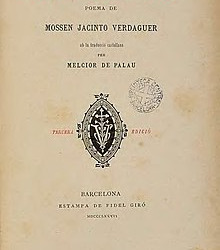
aa
aa
Jardins de Laribal
Jardins de Laribal
jardins, al costat de la Fundació Joan Miró, rs
aa
Jardins de Petra Kelly
porta dels jardins, de Petra Kelly rs
Melaleuca dels jardins de Petra Kelly
Com a record, hi ha una petita bola de terracota amb una figura femenina
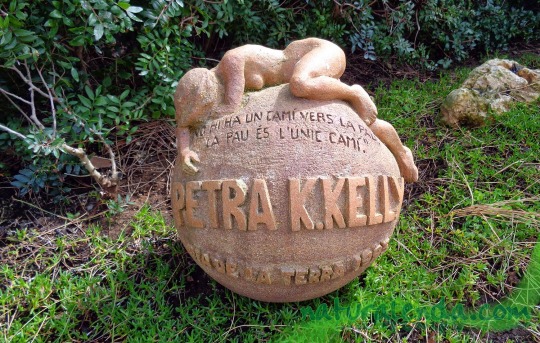
Melaleuca dels jardins de Petra Kelly
…Com a record, hi ha una petita bola de terracota amb una figura femenina abraçant-la. Just al davant hi ha un petit monòlit de pedra dedicat a l'escultor Joseph Beuys, alemany que va incorporar els principis de l'ecologia a la seva obra…
El Jardín de Petra Kelly
es un pequeño espacio dentro del vivero, al que se accede tras subir varias terrazas con tramos de escaleras. Presenta dos monumentos de pequeñas proporciones:A Petra Kelly (1993), de Olga Ricart, una bola de terracota que representa el mundo con una mujer desnuda que lo abraza, con la inscripción «no hay un camino hacia la paz, la paz es el único camino», junto a un ciruelo, el árbol preferido de Petra;3 yA Joseph Beuys(1992), de Lluís Boada y Carles Hac Mor, un monolito de piedra dedicado al artista alemán Joseph Beuys, un firme defensor del ecologisme, junto a una encina y una Malaleuca mesophila, un raro ejemplarde más de 500 años de vida.4
Enric Batlle and Joan Roig Petra Kelly Joseph Beuys Melaleuca nesophila Tres Pins Nursery
aa
aa
aa
aa
0 notes
Video
youtube
Peret, L'Emigrant (Poema de Jacint Verdaguer)
0 notes
Photo

Kiss of Death
Located: Barcelona’s Poblenou Cemetery
Was commissioned by the Llaudet family after their son died at 22. The epitaph bears famous verses by one of Catalan’s greatest poets, Jacint Verdaguer:
“And his young heart can not help;
in his veins the blood stops and freezes
and encouragement lost faith embraces
fall feeling the kiss of death”
6K notes
·
View notes
Photo
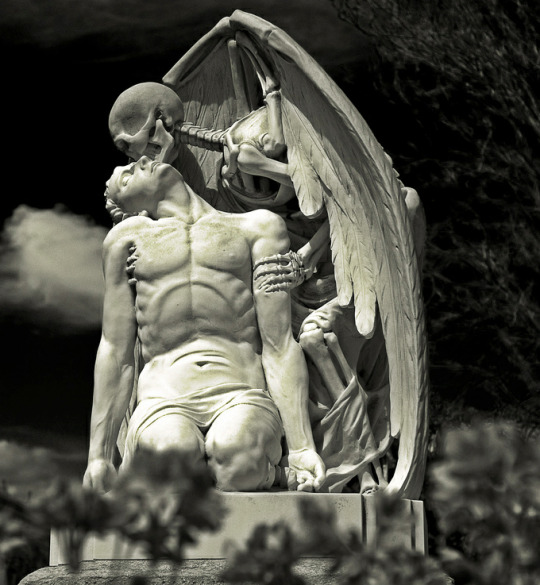
Located at Barcelona's Poblenou Cemetery, this magnificent sculpture, titled Kiss of Death (El Pet de la Mort in Catalan and El Beso de la Muerte in Spanish), depicts death (in the form of a winged skeleton) planting a kiss on a young man's forehead. According to the story, in 1930, the Llaudet family was mourning the death of their son and created this sculpture for his tomb. The epitaph bears famous verses by one of Catalan's greatest poets, Jacint Verdaguer:
“And his young heart can not help;
in his veins the blood stops and freezes
and encouragement lost faith embraces
fall feeling the kiss of death” (x)
4 notes
·
View notes
Note
Hello! Another tumblr user I follow has posed a challenge: memorize one poem per month in 2024. I would like to include at least one poem in Catalan in my journey. Could you recommend any good poems or poets for this?
Hello! We have many very talented poets. My favourite poet is Salvador Espriu, other good ones are Miquel Martí i Pol, Vicent Andrés Estellés, Jacint Verdaguer, Maria-Mercè Marçal, Pere Quart, Josep Carner, Ausiàs March, Joan Maragall, Montserrat Abelló, J.V. Foix, Gabriel Ferrater, Joana Raspall, Joan Alcover, Enric Casasses, among others.
I'll add 7 of my favourite short/short-ish poems (+translation to English) under the cut. Poetry is very personal and these are just the ones that I really like, but I'll be happy if anyone else wants to add more of their favourite Catalan poems.
1. Enyore un temps que no és vingut encara (I Miss a Time That's Not Yet Come) by Vicent Andrés Estellés.
Enyore un temps que no és vingut encara
com un passat d’accelerada lluita,
de combatius balcons i d’estendards,
irat de punys, pacífic de corbelles,
nou de cançons, parelles satisfetes,
el menjador obert de bat a bat
i el sol entrant fins al darrer racó.
Em moriré, però l’enyore ja,
aquest moment, aquest ram, aquest dia,
que m’ha de fer aixecar de la fossa
veient passar la multitud contenta.
Translation:
I miss a time that has not arrived yet
like a past of accelerated fight,
of combative balconies and standards,
angry of fists, peaceful of sickles,
new of songs, satisfied couples,
the living room wide open
and the sun entering until the last corner.
I will die, but I miss it already,
this moment, this bouquet, this day,
that shall make me get up from the grave
watching the happy crowd pass by.
2. Assaig del càntic en el temple (Attempted Canticle in the Temple) by Salvador Espriu.
Oh, que cansat estic de la meva
covarda, vella, tan salvatge terra,
i com m’agradaria d’allunyar-me’n,
nord enllà,
on diuen que la gent és neta
i noble, culta, rica, lliure,
desvetllada i feliç!
Aleshores, a la congregació, els germans dirien
desaprovant: «Com l’ocell que deixa el niu,
així l’home que se’n va del seu indret»,
mentre jo, ja ben lluny, em riuria
de la llei i de l’antiga saviesa
d’aquest meu àrid poble.
Però no he de seguir mai el meu somni
i em quedaré aquí fins a la mort.
Car sóc també molt covard i salvatge
i estimo a més amb un
desesperat dolor
aquesta meva pobra,
bruta, trista, dissortada pàtria.
Translation:
How tired I am of this
my craven, ancient, savage fatherland;
and how it would delight me to leave,
going north,
where they say that people are noble and clean,
cultured, rich, free,
awake/unsupervised and happy!
Then, my brethren would tell the congregation, disapprovingly:
"Leaving his native place, a man becomes
like a bird leaving the nest",
while I, in the distance, would laugh at
the law and the ancient wisdom
of this my arid people.
But the dream will never be followed,
I’ll stay here until my death.
For I too am full of cowardice and savagery,
and with a desperate pain I love this my poor,
unclean, sad, unlucky fatherland.
3. Divisa (Motto) by Maria-Mercè Marçal. This one's short and easy!
A l’atzar agraeixo tres dons: haver nascut dona,
de classe baixa i nació oprimida.
I el tèrbol atzur de ser tres voltes rebel.
Translation:
I am grateful to fate for three gifts: to have been born a woman,
from the working class and an oppressed nation.
And the turbid azure of being three times a rebel.
4. Possible introducció a un epitalami (Possible Introduction to an Epithalamium) by Salvador Espriu
I posted this a while ago, find the text and translation in this post:
5. Plus Ultra ("Further" in Latin) by Jacint Verdaguer
Text and translation in this post:
6. Aquesta remor que se sent (This Murmur We Hear) by Miquel Martí i Pol.
Text and translation in this post:
7. Mester d'amor (Knowing How to Love) by Joan Salvat-Papasseit
Si en saps el pler no estalviïs el bes
que el goig d'amar no comporta mesura.
Deixa't besar, i tu besa després
que és sempre als llavis que l'amor perdura.
No besis, no, com l'esclau i el creient,
mes com vianant a la font regalada.
Deixa't besar -sacrifici fervent-
com més roent més fidel la besada.
¿Què hauries fet si mories abans
sense altre fruit que l'oreig en ta galta?
Deixa't besar, i en el pit, a les mans,
amant o amada -la copa ben alta.
Quan besis, beu, curi el veire el temor:
besa en el coll, la més bella contrada.
Deixa't besar
i si et quedava enyor
besa de nou, que la vida és comptada.
Translation:
If you know its pleasure, don't skip the kiss
for the joy of loving has no measure.
Let yourself be kissed, and kiss after it
for it's always on the lips that love lasts.
Don't kiss, no, like the slave and the believer,
but like the passer-by does with a delightful fountain.
Let yourself be kissed -fervent sacrifice-
the more burning, the more faithful is the kiss.
¿What would you have done if you died before
without fruit other than the zephyr on your cheek?
Let yourself be kissed, and on the chest, on the hands,
male or female lover -the cup raised high.
When you kiss, drink; may the glass cure the fear:
kiss on the neck, the most beautiful place.
Let yourself be kissed
and if there's yearning left
kiss again, for life is finite.
These are some I like. You can find more Catalan poems in this blog's tag #poesia.
#poesia#literatura#arts#ask#3bearsand10000rats#poetry#literature#poems#catalan#català#valencià#coses de la terra#romance languages#vicent andrés estellés#salvador espriu#maria-mercè marçal#maria mercè marçal#jacint verdaguer#miquel martí i pol#joan salvat-papasseit
30 notes
·
View notes
Text
“Vos faig de l’enamorat,
Jesús, i no us amo gaire.
Trist de mi! só flor sens flaire
pel gran Déu que m’ha criat.
Si fos almenys sens espina,
ai!, ja que só sense olor,
consol tindria el meu cor
quan el vostre se reclina.”
— VERDAGUER, Jacint, Roser de tot l’any, Dia 17
2 notes
·
View notes
Text
Sant Jordi/ Le Canigou : plus qu'une montagne, un véritable symbole…
Sant Jordi/ Le Canigou : plus qu’une montagne, un véritable symbole…
« Elevé à 2 785 mètres d’altitude, il culmine, majestueux… « Montagne sacrée des Catalans », comme l’a péremptoirement baptisé Joseph Ribas, écrivain et chantre de ce massif nourricier et ô combien loué, le Canigou s’impose, au fil de l’Histoire, comme une incarnation de l’identité et de la résistance catalanes. Contrairement aux idées reçues, une montagne ne peut objectivement constituer une…

View On WordPress
#2022#Canigou#Jacint Verdaguer#Jean Iglesis#Le Journal Catalan#montagne#perpignan#Pyrénées-Orientales#Sant Jordi#symbole
1 note
·
View note
Text
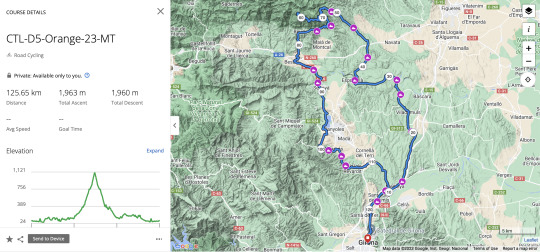
The options for today range from staying in Girona and not touching a bike, to more strenuous day rides. I am opting for a visit to the Mare de Déu del Mont (Mother of God of the Mountain), back up in the Garrotxa. The name denotes the range of mountains as well as the still-popular shrine at the top of its highest peak, El Mont ("Mountain Mountain" being from the same school of place-naming as "River River", apparently).
The peak features much in Catalan literature, where it is referred to as Porta del Pirineu, the gate to the Pyrenees. There is a statue there of the Catalan poet and priest Jacint Verdaguer (1845-1902), who visited and wrote about the mountain and the shrine. He was born on the plain of Vic, studied at the Seminary there, and was later crowned as "Poet of Catalonia" in the monastery at Ripoll. His ode to Barcelona was published by the city council in 1883 in a print-run of 100,000 copies, at a time when Barcelona's population was about 350,000: enough for a copy for every household.
Today's ride, then, is like the ones you can do in Mallorca, when the mountains have taken a lot from your legs: generally flat, with one big climb in the middle to a monastery or similar. Lifts are being offered to those whose resilience has been tested over-far by the mountains and/or the Girona traffic and roundabouts. In the second part of yesterday's long ride, Kate said, with feeling, "I need a time machine." I pointed to the van, and said, "There it is"; but she rode on, valiantly, towards her vision of a glass of chilled wine.
0 notes
Text
CANIGÓ, l'òpera d'Antoni Massana
CANIGÓ, l’òpera d’Antoni Massana
Els antecedents.
El 2 de gener vaig sortir a caminar per Collserola i la gratificant excursió em va dur fins a Vila Joana, la casa on el poeta Verdaguer va passar els seus darrers dies i on ara, envoltada d’un magnífic entorn natural i a la primera planta, hi ha un petit museu dedicat a ell, amb documents i vídeos que repassen la vida del sacerdot i poeta, símbol d’una Catalunya popular, mística,…
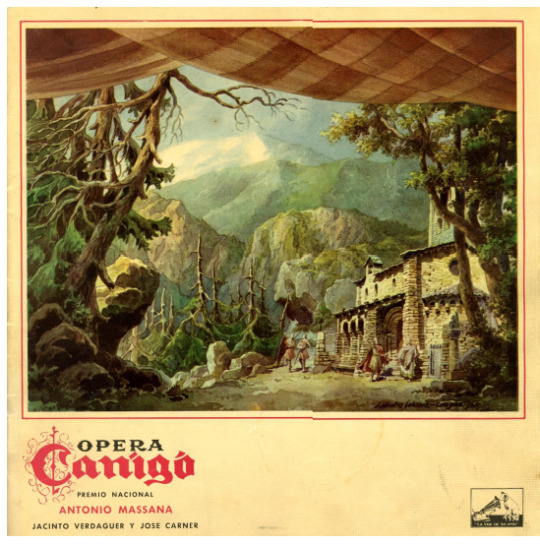
View On WordPress
0 notes